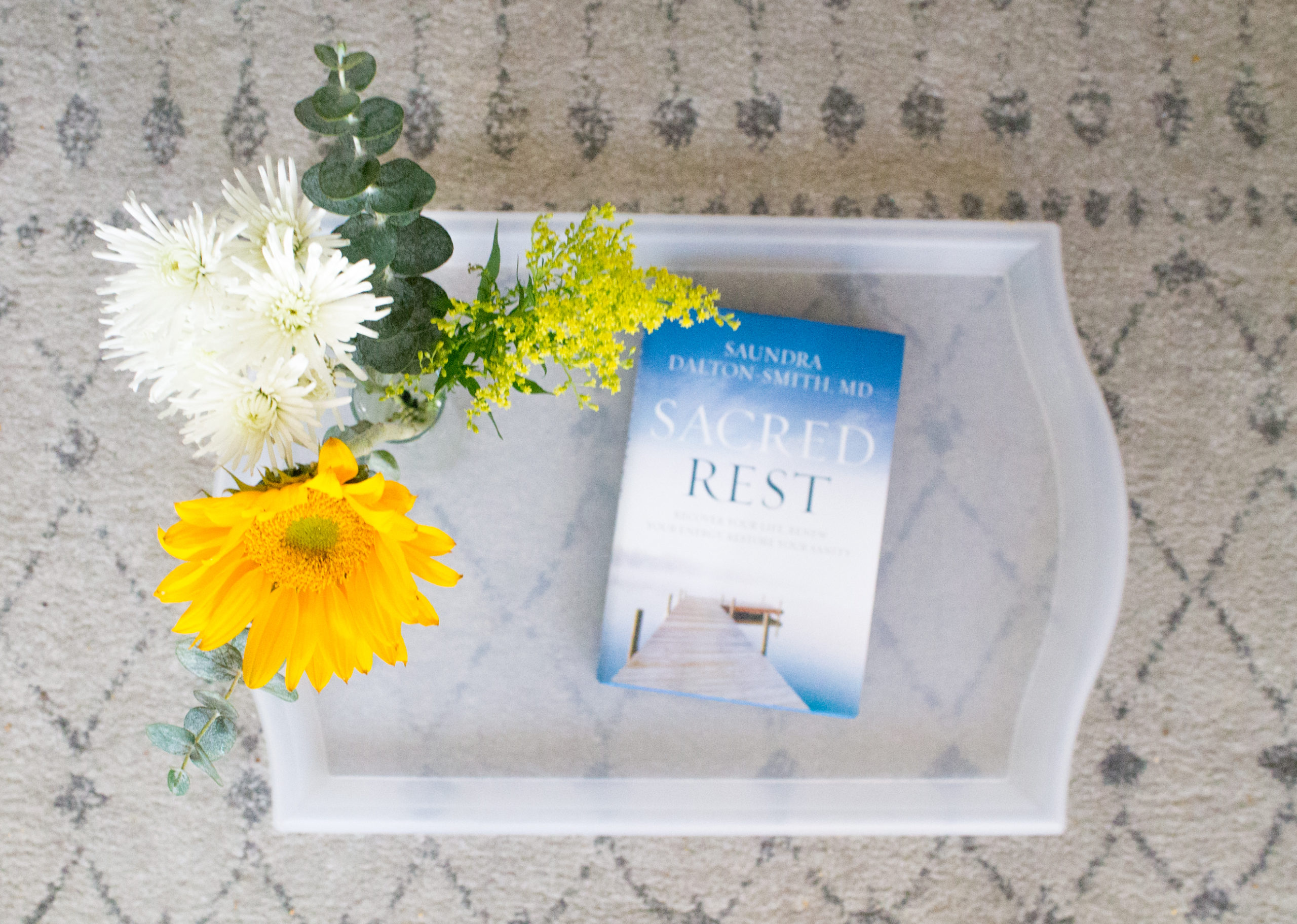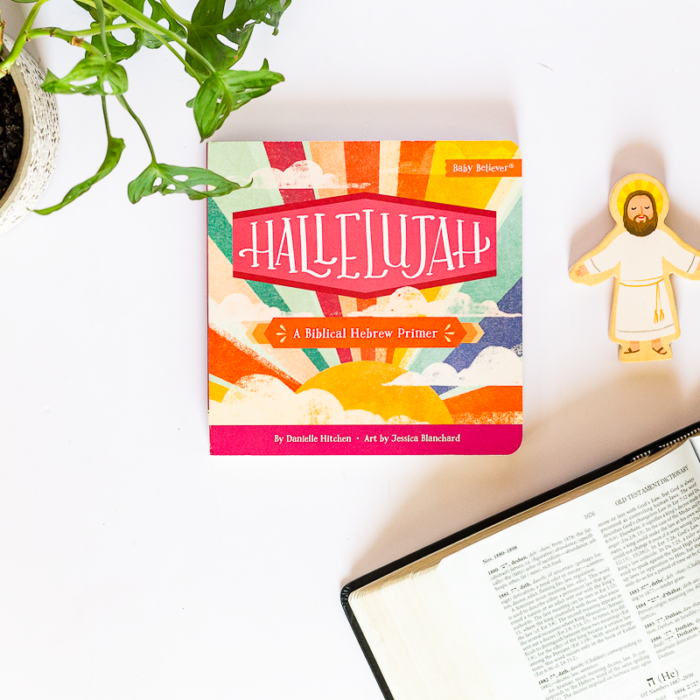This post contains affiliate links
In her latest book, Sacred Rest, Dr. Saundra Dalton-Smith seeks to help readers identify areas of their lives that may be contributing to rest deficits. She brings her medical experience to the table as well as personal experience and empathy for those who are lacking rest physically, emotionally, and spiritually. Sacred Rest begins with Dr. Dalton-Smith describing a time in her life where she was overwhelmed by the weight of the responsibilities her various roles demanded. In her personal account, Dr. Dalton-Smith relates how she was on the edge of burnout as her Type A personality loves to always be on the go. As a Type A personality myself, I could totally relate to her story.
Since the genre of Sacred Rest is Christian Living, I was really interested to see how Dr. Dalton-Smith would encourage fellow Christians to find their best and truest rest in Christ alone.
I expected Sacred Rest to have lots of medical advice since the author is a doctor but the book was actually full of personal philosophies about the effects of rest deficits. I do believe that there is much truth to the growing emphasis on the need for rest, but the advice offered in Sacred Rest leaves much to be desired.
Much of the advice in Sacred Rest is very self-centered.
Evidence of this includes the opening quote of chapter 2 by author Douglas Pagels which states, “Sometimes it’s important to work for that pot of gold. But other times it’s essential to take time off and make sure your most important decision in the day simply consists of choosing which color to slide down on the rainbow.” While this may be heartwarming to some, I found it to be sentimental nonsense and I’m still not sure what it means to slide down a color of the rainbow or how one would even accomplish such a task.
On page 63 of the book, readers are encouraged to, “Take an inventory of the people in your life who drain you and those who refresh you. Then take the initiative to end or limit toxic relationships and intentionally surround yourself with those who have a positive effect on your life.” As a Christian, I was appalled to find such advice in a book on “Christian Living.” This sentiment is directly opposed to the commands of Christ in Scripture including fulfilling the Great Commission and living a life that is others oriented (Mark 10:45, Philippians 2:3-8).
Considering that we were at all one time dead in our trespasses and sins, we have all at one time been “toxic.” However, as those whose hearts have been changed, we have a responsibility to glorify God by making Him known and if we are only around those who we consider to have positive effects in our lives, I question how this great task will be accomplished. Proverbs 27:6 says, “Faithful are the wounds of a friend; profuse are the kisses of an enemy” – one may choose to limit relationships they consider to be “toxic” but this verse is warning that doing so is unwise because those who only tell us what we want to hear are actually doing us a disservice. Faithful wounds from friends allow us to see sin we need to repent of and create relationships that allow us to encourage one another to keep our hearts from being hardened by the deceitfulness of sin. Having such relationships is imperative to growing as a Christian.
It is also imperative that Christians find their identity in Christ alone, yet page 64 of Sacred Rest, tells readers, “It’s time to stop hustling to find your worthiness. Instead, rest in the self-awareness of your unique quirks and propensities.” Again, this sounds great and encouraging but it is truly very self-centered. If you were to perform a word search of the entire Bible, you would fail to find the term “self-awareness” because this idea is not Biblical. Self-awareness is a theory that was developed by two psychologists in the 1970s and has to do with giving oneself an internal inspection and evaluating oneself according to your own personal standards. Scripture tells us that when we look inside, we see that, “. . .the heart is deceitful above all things, and desperately sick,” (Jeremiah 17:9). The only hope we have is found in Christ alone. Once we turn from sin and trust in Him for salvation, we are a new creature and thus, have a new identity rooted solely in Christ’s righteousness.
Along with a huge emphasis on self-centeredness, Sacred Rest also contains many theological errors.
On page 67, Jesus is referred to as a “. . .two-thousand-year old Messiah.” I believe Dr. Dalton-Smith has confused who Jesus is with the belief widely held by New Testament scholars that Jesus was on earth approximately 2,000 years ago. In John 8:58, Jesus identifies Himself as God as He refers to Exodus 3:14, “. . . Truly, truly, I say to you, before Abraham was, I am.” In Revelation 1:4, John refers to Jesus as, “. . . him who is and who was and who is to come. . . “. From these verses, it is clear that Jesus has always existed. It is believed that Jesus lived to be about 33 years old as a human before ascending into heaven but even then, He still existed prior to coming to earth to die on behalf of those who would turn from sin and trust in Him. This may seem like a minor, unimportant detail but if we don’t know who Jesus is, then we are left without hope for salvation. It is crucial to recognize that Christ is God and while He did dwell on earth for a while, He has always existed and has no end. Were He to have an end (whether it be 33 years or 2000), He would not be God and would not have been able to fulfill God’s demand for a sinless sacrifice to reconcile a sinful people to Himself and accredit to them His righteousness.
Another theological error can be found on page 74 where readers are falsely told that that holiness takes a backseat to loving God. The book states, “As much as He would love for us all to be holy, His first request is simply to love Him.” This idea may sound really heartwarming but is actually contradictory to Scripture. Christians can’t actually love God until they have been made holy by Him through Christ. In reference to life before Christ, Ephesians 2:1 states, “And you were dead in the trespasses and sins in which you once walked. . .” Since we were dead prior to Christ acting on our behalf, there is no possible way we could have loved God. Furthermore, since Christian faith is proved by works, it follows that living a life of holiness, which is commanded multiple times in Scripture (Leviticus 11:44, Leviticus 11:45, Leviticus 19:2, 1 Peter 1:16), is one way that we can show God we do love Him.
In an earlier paragraph on page 74, Dr. Dalton-Smith said, “Allow room for the creative nature of God to reveal specific ways you feel most connected to Him.” This idea is very concerning to me because it sounds much like the unbiblical practice of contemplative prayer similar to what Sarah Young encourages in her book Jesus Calling. The Bible doesn’t instruct believers to do any of this nonsense. It’s also dangerous to rely on feelings as an indicator of one’s “connection” to God because feelings don’t determine truth and the truth of Scripture is that if you are truly saved, it was God who accomplished your salvation. Feelings are fickle and often the result of circumstances but the Gospel is such good news because no matter what your feelings may tell you, your position in Christ is secure and nothing can change that.
The same section of this book also encourages readers to, “Explore the heart of who He (Jesus) is until you get to God,” but a few sentences prior, readers are told there is “No prerequisite to read a chapter in your Bible or do any other ritualistic behavior.” I find these ideas to be not only misleading but heartbreaking. First of all, Jesus is God (John 1:1) and we can’t know Him apart from the Bible (John 1:1, Hebrews 1:2, Revelation 19:13). Scripture also shows us that our attitude towards the Bible ought to be such that it is a treasure, the joy and delight of our heart, so we can infer that our approach to Scripture should not be viewing it as a ritualistic behavior.
On pages 74-75, readers are encouraged to practice communion – “In the privacy of your secret place, lift both hands high above your head and simply profess, ‘I need help.'” In the same section, Dr. Dalton-Smith wrote, “If you start shouting and cursing God at the top of your lungs, that’s OK . . .” Although the word “communion” isn’t actually in Scripture, the practice that most churches implement today is found in 1 Corinthians 11. A look at this passage on the Lord’s supper reveals that Paul wrote this to the Corinthian church (verse 18 says, “. . . when you come together as a church. . . “) so we see that communion is not a private act but rather a corporate one involving the local church body. A quick dictionary search reveals that the word “communion” comes from the Latin word “communio” which means mutual participation. Communion is a time, “. . . to proclaim the Lord’s death until he comes,” (1 Corinthians 11:26) which demands a heart of repentance over sin and rejoicing over what God has accomplished for us in Christ. Cursing at God is sinful as it involves unrighteous anger and allows the one cursing to assume the false position of judge when that position is reserved for God alone.
The ideologies in Sacred Rest are so opposed to the concept of rest described in Scripture. It makes no logical sense that this book is marketed as Christian in genre. However, when I learned that the publisher, FaithWords, has also released books by popular false teachers including Joyce Meyer and Joel Osteen, I was not at all surprised. My hope is that this review will encourage you to steer clear of the secular philosophies disguised in this “Christian” book and to avoid all other books released by FaithWords.
Of even greater importance is my desire that you would cherish the Word of God – that like Ezra, you would study, know and do it, that like Job you will treasure the word of His mouth as more important than food and like Jeremiah, you will see His words as the joy and the delight of your heart.
If you are looking for a Christ-centered, Biblically-based work on rest I encourage you to check the resource below.






